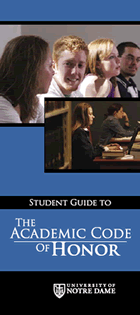
Is it cheating to find homework answers online, or in the back of a textbook, and make corrections before handing in the assignment?
What if a student turns in a science experiment or a term paper that he or she did for another class? Is it cheating to recycle old work?
When is it okay to use information from the Internet? Or from your roommate, for that matter?
Incoming undergraduates have been pondering such questions this summer as part of an electronic tutorial that exposes them to Notre Dames recently revised Academic Code of Honor. Students must successfully complete the multiple-choice tutorial before they can sign the Universitys honor code pledge, a precursor to enrolling.
We needed to do something more to make students familiar with the honor code,said Thomas Flint, a philosophy professor and Faculty Honor Code officer. Along with associate provost Dennis Jacobs, he directed the creation of the tutorial with assistance from several faculty and student members of last years University Code of Honor Committee. The tutorials transition to an online exercise was the work of Chris Clark of theKanebCenterfor Teaching and Learning.
The new Web-based program takes first year, transfer and returning students through a series of case studies in four areas where honesty issues frequently arise: acceptable collaboration with other students, falsifying data, test taking, and plagiarism. Throughout the summer, incoming students quickly took to the challenge, with 85 percent succeeding on their first attempt.
The case studies are fictional but reflect classic honesty dilemmas, if not a flair for plot and character development. They feature such instructors as Professor Chirac, a French teacher; thelegendaryanthropology teacher Michigan Smith; a forestry instructor named Pine; and an ROTC instructor (teaching Aerial Warfare) named Professor Weis. (A key requirement of the honor code is that students reveal when they have worked with others. Thus,Flintcredits committee colleagues with some of the punchier content. Dottie Pratt conceived Michigan Smith and Sam Gaglios subcommittee invented the forester Professor Pine.)
Sometimes the fictional students in the case studies face a situation that is complexly nuanced. Often, however, they just didnt leave enough time to complete their work.
Time, saysFlint, is a big factor in honesty cases.
Students have made it clear that decisions to cheat are often made when they feel they dont have enough time to do their own work honestly,he said.Sometimes the students probably are just too busy to get everything done.Often, of course, theyve simply put things off, are starting to write a paper the night before its due, and succumb to the temptation to cut-and-paste from the Internet.
Good moral judgment alone is probably not enough to help a student succeed on the tutorial; they need to have read the code. Thats deliberate,Flintsaid.
We do want our new students to be thinking about the importance of academic integrity in general, but we also want them to be familiar with how those general principles are applied here at Notre Dame,he said.
Two incoming freshmen who succeeded on their first try and who carefully read the student guide to the honor code before completing the exercise say it opened their eyes to the honesty issue.
It really made me think about the different areas of cheating and how things that we dont normally consider to be cheating really are,said Laura Verwilst ofSouth Bend.I used to think of cheating as simply looking off someone elses test or having a cheat sheet.
Cory Hayes Hakanen, an incoming freshman from Granger, says the case studies helped illuminate the language of the honor code.
The honor code pledge was more involved than I initially thought it to be,he said.Academic dishonesty and academic know-how is a fine line, and I am glad that the testcleared up some issues that I may not have understood otherwise.
The online tutorial is the second phase of an effort by honor code committee members to emphasize the importance of academic honesty amid national reports of rising incidents of cheating, both at the college level and in high school. The first phase consisted of a set of guidelines unveiled by the Provosts Office last fall that more clearly described honor code violations, along with a new violation-reporting option that simplified the process of identifying and addressing dishonesty.
TopicID: 18662